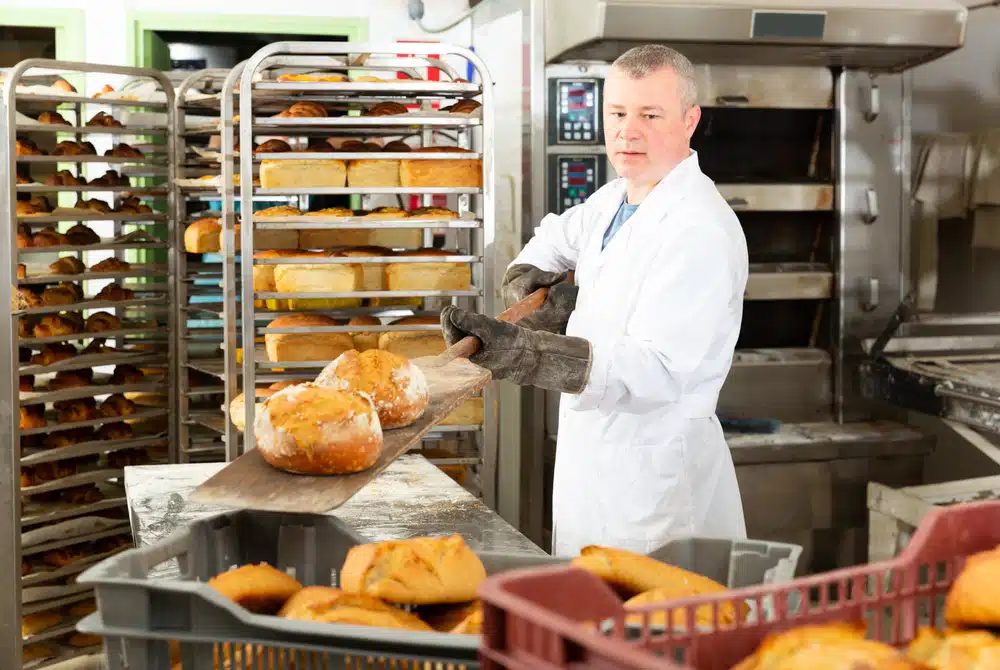
Another key issue is allergens. With the rise of food allergies in recent years, it is more important than ever to make sure that all bakery products are clearly labelled and free from any allergens that could potentially trigger an allergic reaction. This includes nuts, eggs, dairy, gluten and so on. Failure to adequately label products or to take proper precautions with allergens could lead to costly legal action.
If you run a bakery there are certain pieces of legislation you need to be aware of. If you are lacking in knowledge in this area, fear not, you have come to the right place.
What licences does a bakery need?
In order to run a bakery business you will need to register with your local authority environmental health department since it will prepare, store, and selling food. As a result of their inspection, you will be able to comply with the requirements of the Food Safety Act. In order to register in plenty of time for your event, it would be a good idea to contact your local authority early in your planning process. Registration is free.
Organic products
Selling organic bakery goods requires organic certification, so you should be aware of this. For inspections and certifications, there is an annual fee. Guidance can be obtained from the Soil Association.
Background music
Music Licenses from PPL PRS Ltd are required for playing background music in the bakery or café areas. Licence fees are assessed annually.
Food safety
Regulations governing food safety must be followed by all businesses in the food sector. A local authority environmental health department must be notified before your business opens. You can get advice and guidance from your local environmental health officer about what you need to do to keep your operating areas hygienic and how to comply with the Food Hygiene Regulations, which were introduced under the Food Safety Act. On the website of the Food Standards Agency, you can find more information about food safety legislation.
There are restrictions on how certain terms such as wholemeal can be used, as well as permitted ingredients in bread. Bread packaging and shelf-life regulations, as well as food labelling regulations, specify what must be included on bread packaging or displayed at the point of sale.
Producing and selling organic bakery products is covered by the Organic Products Regulations.
Unwrapped bread over 300g in weight cannot now be sold in quantities greater than 400g, as per newregulations. The prescribed weights were known as prescribed weights. If you don’t use the traditional 400g, 800g, etc. weights, you must tell customers about quantities if you sell unwrapped bread in any size.
Meat pies, pasties, and sausage rolls must be labelled, have a minimum meat content, and be labelled as meat products and spreadable fish products. If you require advice, contact the Training Standards Office in your area.
Members of the Craft Bakers Association (CBA) can find many useful publications covering the regulations that apply to the bakery industry.
Food hygiene rating scheme
The food hygiene rating must be displayed by all food businesses in Wales, including manufacturers, wholesalers, caterers, and retail stores. Likewise, food businesses selling food directly to the public in Northern Ireland are subject to this rule. It ranges from 0 to 5, with 5 indicating high levels of hygiene. The lowest rating is 0, which indicates urgent improvements are needed. In the rest of the UK, similar schemes exist, but they are voluntary.
Food waste
You must properly dispose of food waste if your business produces it. You cannot feed it to livestock or let it contaminate the environment. Waste carriers need to be properly authorised in order to remove your waste. The Gov.uk website provides information about your responsibilities.
Consumer protection
Unfair business practices are prohibited under the Consumer Protection Act and Regulations made under it. The website of Trading Standards Central provides more information.
Clean Neighbourhoods and Environment Act
Businesses are responsible for removing any litter caused by their retail activities around their premises. Takeaway food or drink packaging, empty crisp packets, sandwich wrappers and so on would be examples.
Carrier bag charge
English firms with fewer than 250 full-time equivalent employees must pay 5 pence, but small and medium-sized businesses are exempt. On the gov.uk website, you can find detailed guidance.
If retailers provide customers with a single-use carrier bag, they must charge them at least 5 pence. Plastic, paper, and plant-based starch bags are all single-use bags. You can find detailed information on the websites of Gov.Wales and Zero Waste Scotland.
If a bag costs less than 20 pence, retailers in Northern Ireland must charge customers a 5 pence levy (including free bags).
Health & Safety, fire
Fire and health safety legislation must be followed at work.
Employment legislation
Employment laws must be followed by anyone who employs staff. Among the most important areas of employment legislation are recruitment, employment contracts, wages, working hours, holidays, employment policies, sick leave, maternity leave, paternity leave, discrimination, discipline, grievances, dismissals, and redundancies.
Insurance for a bakery
Describe the exact workings of your business to an insurer or insurance broker so they can tell you what insurance cover you must have and other cover you should consider. The following might be included:
- Premises, premises contents and stock
- Goods in transit (for example on the way back from a cash and carry, or delivering to customers)
- Freezer breakdown
- Cash
- Business interruption
- Employers liability
- Public and products liability
- Motor insurance (for delivery and other vehicles)
Insurance products tailored to the bakery industry are discounted for members of the Craft Bakers Association.
Conclusion
Legal issues which may bakers need to be aware of include the competition law when running a bakery business. This ensures that prices are not fixed between different bakeries and that there is no collusion between businesses. Competition law can be complex, so it is advisable to seek legal advice if there are any concerns. Food safety and allergens are particularly important considerations, and it is also necessary to be aware of competition law. With proper precautions in place, however, these issues can be effectively managed to ensure that no future legal issues for the bakery.
Lee Jones is a seasoned Business Finance Specialist with over two decades of invaluable experience in the financial sector. With a keen eye for market trends and a passion for helping businesses thrive, Lee has become a trusted advisor to countless organizations seeking to navigate the complexities of finance.


